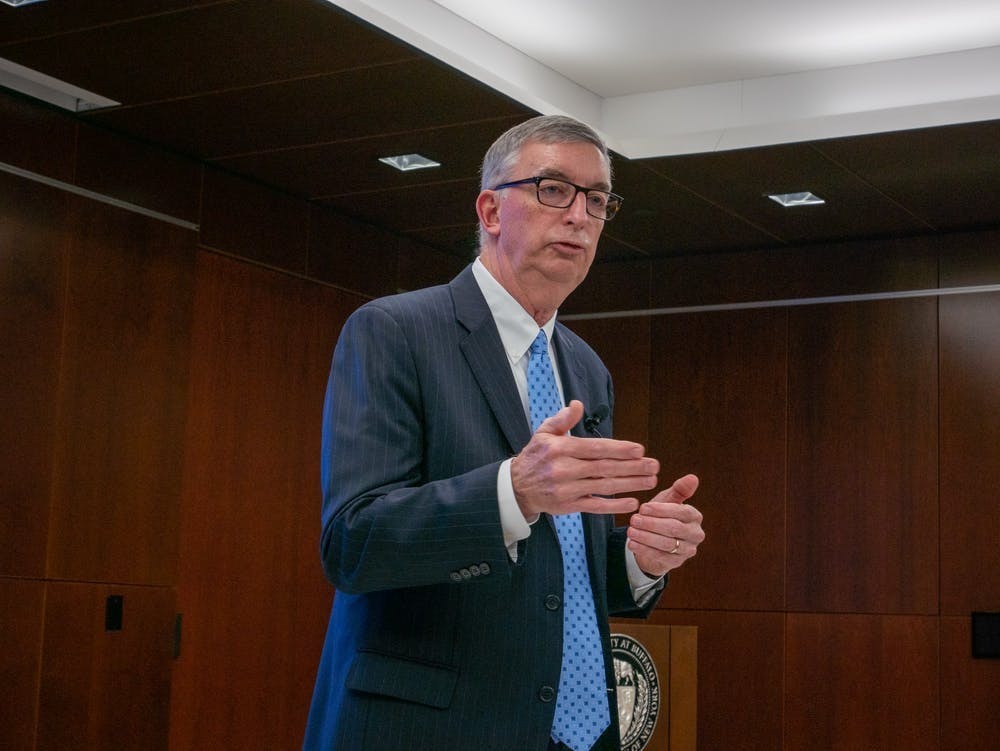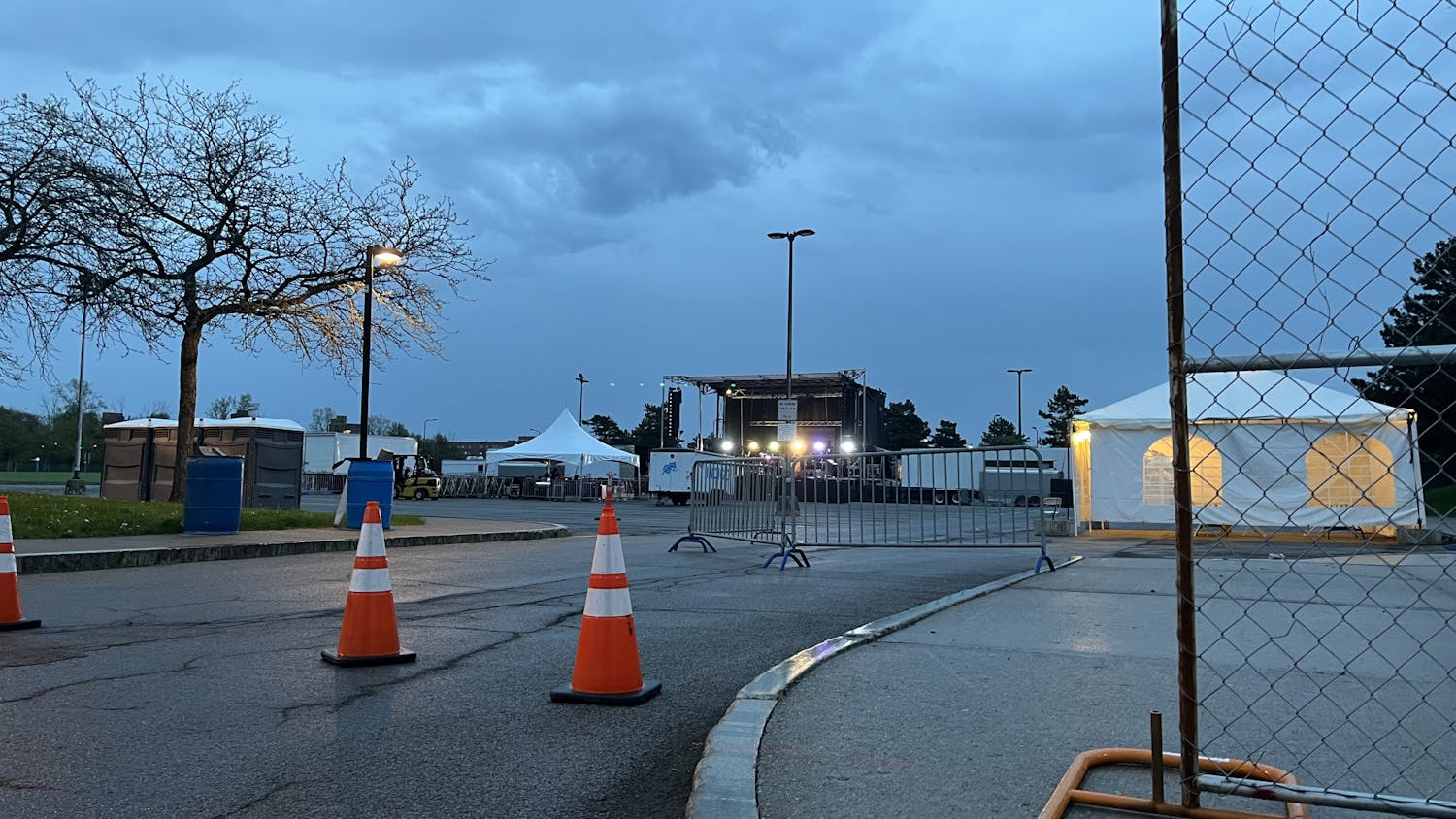Students have questions for A. Scott Weber as he transitions into his role as the second-highest ranked UB official.
But they mainly want to know one thing:
What does the “A” stand for?
UB named Weber provost and executive vice president for academic affairs on Jan. 9. The decision came after four months of Weber acting as interim provost following Charles Zukoski’s Oct. 1 move to the University of Southern California. During his campaign for the position, Weber presented several plans to improve the UB community, including increasing faculty diversity and student retention rates. Weber was previously UB’s vice president for Student Life and senior vice provost for academic affairs.
Students on Reddit shared some concerns they’d like the new provost to address. We sat down with Weber to discuss it all.
Our interview, lightly edited for length and style, follows below.
The Spectrum: During your campaign for provost you cited wanting to tackle several different issues including faulty diversity and student retention. What is your main goal during your time as provost?
Weber: So the reality is that as provost you have to pursue multiple goals simultaneously. So we’ll pursue all our goals in parallel and our real drive is to be a top-25 public research university.
TS: What do you hope to address in your new position that you might not have been able to in previous positions you’ve held at UB?
W: The proper, sensitive, incredible central nexus of academic decision making on campus, and I don’t know if you’re aware of what the provost job is, but it’s really the chief academic officer of the university. So when you think about that, the provost job is really to marshall human, financial, physical capital of the university toward its goals. Budgetary decisions are made in the provost’s office and when you’re budgeting, you’re essentially prioritizing at some level. So what being in the provost position allows you to do is to certainly have more influence on how to provide their needed resources to move the priorities and shared goals of the university forward. But what’s different about this position? I think one of the most important parts of the position is that you’re really making recommendations on the promotion and tenure. It’s really a privilege to be able to review almost 100 cases this year for faculty coming up for promotion and tenure.
TS: Is there any advice that former provost Zukoski gave you as you entered his previous position?
W: Have fun. He said, and I think he’s honest, there’ll be days that will be trying and days that are wonderful but try to remember to enjoy the work you do, which I do. I love the work of this office, as well as all the other jobs I’ve ever had on campus. I love every one of them. But really, it’s incredible when you’re in this position.
TS: During your provost pitch you referenced a plan to increase the diversity level of UB faculty from 5% to 10%, can you explain this plan and when do you anticipate its implementation and how long do you expect a plan like this to take?
W: It’s already beginning. Last year we added 17 faculty members through the New York State prodigy program. So I think what we have to be doing is thinking every day about how this works for us and why it’s so important [for] the future of the university as our student body becomes more diverse. It’s really important that our faculty represent [the student body] so that we have role models. With that being said, I think there are some things that we need to do that are more central. If you think about our search process and how we’ve become more intentional in our search process, right now if you look at the pool of underrepresented minorities, or nationally, we actually hire at higher levels than that. So we’re actually doing a pretty good job. Part of the problem is the [pool of applicants], so the number of underrepresented minority faculty that are in the [pool of applicants]. And the other challenge for us, of course, is that almost every school in the nation has the same ambition, and rightly so, to increase the diversity of their faculty. So there’s intense competition.
TS: Also during your pitch, you referenced UB’s student retention rates citing that other top-25 research universities see retention rates on 90% or higher, whereas UB sees rates hovering around the mid 80%. Do you have an established plan to promote student retention?
W: When I was the senior vice provost for academic affairs, we made a decision that we wanted to increase our four and six-year graduation rates. So we started the Finish-in-Four program, and over the last eight or nine years [it] has really changed the trajectory of the graduation rates in the university's undergraduate population. We’ve gone from about 40% to around 60%. But the most important part of that was the changing of culture across the campus, that it became the expectation both for our students, our parents, that we're supporting our students, and our faculty and staff, deans or whatever. That was a university priority. Students can be really some of the best ambassadors. But how do we make it easier for them to help a fellow student get in to see an advisor? Or maybe it's a college counselor that they need to see, I mean, there's many aspects of that. So I think it's also changing I think the most important part of that is changing the culture and integrating the students into that culture.
TS: Do you plan on still overseeing Greek Life in your new role? Do you plan on tightening restrictions?
W: No, that’s something that’s not part of the provost’s purview. That’s in Student Life.
TS: Students have presented concerns about the Capstone requirement, citing its relevance to their education and degrees. How would you express to students why you feel this is important to their academic experience?
W: So I think capstones [are important]. I think the ability to synthesize and bring together material from a multitude of sources and experiences across the campus is one of the most essential elements of a student’s education. So while we might like students to do that on their own, I think having a process that allows a platform by which they can do that in an organized and systematic way and receive feedback to that is incredibly important, I think one of the real goals.
TS: Reddit wants to know this one: What’s your favorite chicken wing place in Buffalo?
W: That’s super easy for me because I don’t eat chicken wings. But if I had to pick a favorite, I love history and I love tradition, I would pick the original Anchor Bar.
Reilly Mullen is the assistant news and features editor and can be reached at reilly.mullen@ubspectrum.com or on Twitter @ReillyMMullen.

Reilly Mullen is the editor-in-chief at The Spectrum. She is a senior majoring in political science with a journalism certificate. She enjoys Dunkin’ iced lattes and Scrabble. A former web, features, news and managing editor, she is a columnist at heart but has covered everything from UB Football to breaking news.





